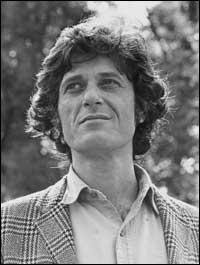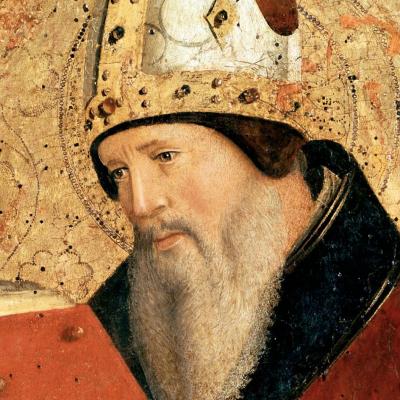At dinner in a restaurant the other night, my poet friend J. quoted Wallace Stevens: “The philosopher proves that the philosopher exists. The poet merely enjoys existence.” It happened that a person at the next table, a professor of philosophy at Brandeis University, overheard the line and took issue, maintaining that no one in the place could have enjoyed one’s meal more than he, and that the bottle of wine we had ordered was mediocre. The exchange reminded me that in 1978, I published an essay titled “Bad Blood” by Leonard Michaels in The Chowder Review, a romp through the squabbling ranks of poets and philosophers. (When the piece appeared in The Essays of Leonard Michaels in 2009, Farrar Straus claimed that the piece had first appeared in University Publishing, UC Berkeley, 1978. Not true!) RS
* * * * *
BAD BLOOD
Ever since Plato said poets must be evicted from the Republic and murdered if they return, things have not been good between poets and philosophers. By philosophers I mean theoretical persons, more or less systematic in language. Poets make language erotic. This is the main difference between them. The rest is scandal, a history of bad blood. Here are moments:
* Goethe refused to read Hegel, though Hegel wanted to be his friend.
* Rilke refused to talk to Freud.
* Blake hated Bacon, Locke and Newton. “I must invent a system,” he cries, “or be enslaved by another man’s.”
* In his elegy for Stella, Jonathan Swift claims she once shot a burglar and could refute the philosophy of Hobbes at any time.
* Wallace Stevens says, “Marx has ruined nature.”
* To Nietzsche poets are disgraceful because they exploit their experience.
* Sartre’s books on Genet and Flaubert, so analytical and flat, seem inspired by envious greed.
* Freud thinks Shakespeare is depraved, but says his plays were written by the Earl of Oxford.
Marx began as a poet, failed, and converted to philosophy – perhaps in self-loathing. Renowned for self-loathing are T.S. Eliot, who wrote a dissertation in philosophy, and Coleridge, who was ravished by the Schlegels. Keats belongs to this group, too; manifest poetical genius, he wondered if he was philosophical enough. Plato, who started this ancient violence, was himself a poet.
 “Whereof we cannot speak, we must be silent,” says the philosopher Wittgenstein in a mean little poem against poets. Negative thrust from “cannot” to “must” slams the sentence shut. Wittgenstein also says language is a scum on the surface of deep water. To put this differently, some things lie too deep for the scummy touch of words. In this at least poets and philosophers agree. Simone Weil says a poem is beautiful insofar as the poet fixes his mind on what cannot be said. Nietzsche says his ideas are less good after he writes them. Socrates never would write anything. Plato said a philosopher betrays himself by putting his ideas into words. Even Blake, a great loquacious poet, admits something not to talk about:
“Whereof we cannot speak, we must be silent,” says the philosopher Wittgenstein in a mean little poem against poets. Negative thrust from “cannot” to “must” slams the sentence shut. Wittgenstein also says language is a scum on the surface of deep water. To put this differently, some things lie too deep for the scummy touch of words. In this at least poets and philosophers agree. Simone Weil says a poem is beautiful insofar as the poet fixes his mind on what cannot be said. Nietzsche says his ideas are less good after he writes them. Socrates never would write anything. Plato said a philosopher betrays himself by putting his ideas into words. Even Blake, a great loquacious poet, admits something not to talk about:
Never pain to tell thy love
Love that never told can be
For the gentle wind does move
Silently, invisibly.
Freud turned deepest silence into a medical industry based completely on talk, but he still saved a place for silence:
Even in the best interpreted dreams, there is often a place that must be left in the dark, because in the process of interpreting, one notices a tangle of dream-thoughts arising which resists unraveling … This is then the dream’s navel, the place where it straddles the unknown.
A silent navel appears in the voluminous St. Augustine. Of all places, it appears in his Confessions. He remembers a conversation in which he and his mother achieved sublimity, relieved of words:
And while we spoke of the eternal Wisdom, longing for it, straining with all the strength of our hearts, for one fleeting instant we reached out and touched it. Then with a sigh … we returned to the sound of our own speech, in which each word has a beginning and an ending.
They returned, sinking into miserable sound. In Wallace Stevens’ poem, “Waving Adieu, Adieu, Adieu,” he redeems us from sound:
That would be waving and that would be crying,
Crying and shouting and meaning farewell,
Farewell in the eyes and farewell at the centre,
Just to stand still without moving a hand.
This poem is about living, or subsisting, in the prospect of death, without sound or action. The philosopher, says Plato, lives a dying life. “Imagination Dead Imagine,” says Samuel Beckett.
 When his mother died, St. Augustine showed no sorrow to the mourners, but he couldn’t hide it from himself or God, so he went to the baths and, in the obscurity of the vapors, let tears slide down his face. “What was it that caused me such deep sorrow?” he asks. Has there been a more desperate question? Teacher of rhetoric, St. Augustine occupied “the chair of lies.” He says this lying rhetoric is a mysterious gift, impossible really to teach, but since he pretended to teach it, he was a liar on two counts. You see why he yearned to be relieved of words. When his bastard son dies, St. Augustine says nearly nothing. Hegel, Byron, Wordsworth, and Marx also say nothing or nearly nothing about their sad bastards who died young or otherwise disappeared. Is there a tradition of silence among philosophers and poets regarding bastards? Rousseau is an exception. He raves about his five or six bastards, as if there is no place in our lives whereof we cannot speak. But who believes Rousseau could have had bastards?
When his mother died, St. Augustine showed no sorrow to the mourners, but he couldn’t hide it from himself or God, so he went to the baths and, in the obscurity of the vapors, let tears slide down his face. “What was it that caused me such deep sorrow?” he asks. Has there been a more desperate question? Teacher of rhetoric, St. Augustine occupied “the chair of lies.” He says this lying rhetoric is a mysterious gift, impossible really to teach, but since he pretended to teach it, he was a liar on two counts. You see why he yearned to be relieved of words. When his bastard son dies, St. Augustine says nearly nothing. Hegel, Byron, Wordsworth, and Marx also say nothing or nearly nothing about their sad bastards who died young or otherwise disappeared. Is there a tradition of silence among philosophers and poets regarding bastards? Rousseau is an exception. He raves about his five or six bastards, as if there is no place in our lives whereof we cannot speak. But who believes Rousseau could have had bastards?
According to Hegel, to say anything is to risk annihilating your interiority. That is, to speak is to risk being understood or losing yourself to others. According to Valéry there is no such risk, because a spoken word never says exactly what it means. According to Roland Barthes the Marquis de Sade leaves nothing unsayable. Whereof we cannot speak, Sade speaks. Barthes puts it this way:
“… to conceive the inconceivable, i.e., to leave nothing outside the words and to concede nothing ineffable to the world: such it seems is the keynote of the Sadian city.”
When Wittgenstein says, “Whereof we cannot speak we must be silent,” he echoes the Biblical injunction: “Thou shall not take the name of the Lord in vain.” The Marquis says, “Thou shall.” About the human body, a character in The Canterbury Tales says, “Thy sound is foul at either end.” This holds for the Marquis de Sade who literally identifies one hole with the other. This whole question, entailing relations of speech and silence, appears in Beckett’s story, “First Love”:
She began to undress. When at their wit’s end they undress, no doubt the wisest course. She took off everything, with a slowness fit to enflame an elephant, except her stockings, calculated presumably to bring my concupiscence to a boil. It was then I noticed her squint.
“Squint” means ambliopia, a crooked condition of the eyes. A famous use of it occurs in King Lear. He says, “Dost thou squiny at me?” Beckett’s use of “squint” intends many things, among them a condition of the hero’s eyes. They cannot, when the woman is naked, look at her silent place, a place he cannot even mention. She is naked, he mentions her “squint.” Whereof we cannot speak, we make a joke. Beckett’s hero gives “squint” above for one below. High is low, the image strong, the hero silent. Whereof he cannot speak bespeaks his silent place which is at her “wit’s end,” not his. Now we know where one’s wit’s end might be. “Squint,” being a pun, speaks twice while the hero is silent. Whereof we cannot speak, silence discovers a word. The Bible says this was true in the beginning. All real poets have said this, too, and all their work is a demonstration of its truth. It is no wonder that philosophers, insofar as they are committed to demonstrate the opposite, hate poets.
Beckett’s hero meets the woman near the grave of his father. This is an obvious irony. Death, Silence, Love, and Holes begin to slither among words like blood among cells, quickening them. In a word Beckett squints at the world. Now hear Freud, voice of philosophy, applied to Beckett’s subject:
It is worth noticing that the genitalia, the sight of which is always exciting, are nevertheless hardly ever judged to be beautiful.
Is this really worth remarking?
In one school of oriental painting, it is conventional to leave the center of paintings empty. The central place gods may enter. Whereof we cannot/must not speak is then conceived by philosophers, poets, and painters as high, deep, and central. Could it also be in a corner? High, deep, and central means it is everywhere. Whereof we cannot speak is everywhere we are.